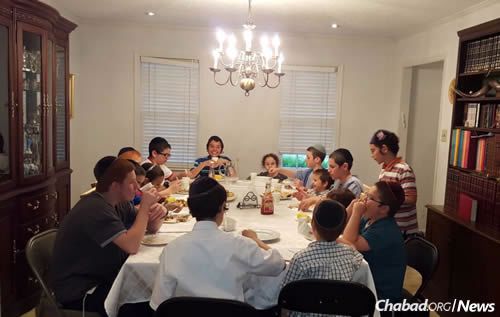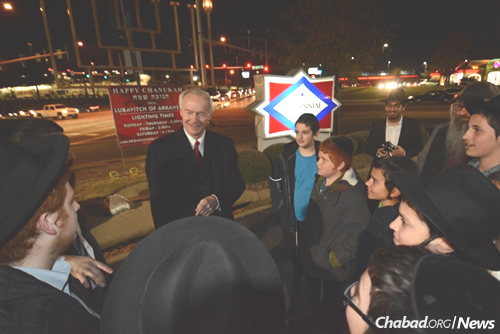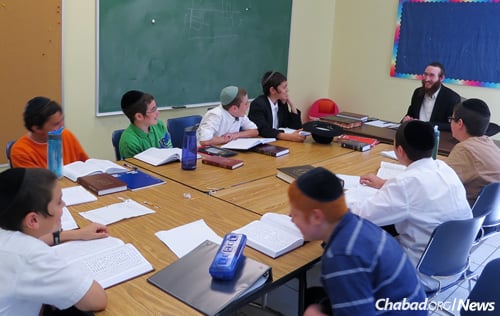Little Rock, Ark., seems like an unlikely place for a yeshivah junior high school. Yet September saw an influx of adolescent boys from across the country converge on the southern city with a Jewish population of roughly 2,000 people.
The sons of Chabad emissary families—most of whom had been students at local Jewish day schools or the Nigri International Shluchim Online School—were ready to take their Judaic studies to the next step.
“It really changes the entire community for the better. It’s a pleasure to see the boys learning and praying at the Chabad House,” says Marvin Schwartz, a retired journalist and university instructor who came to Arkansas from Brooklyn, N.Y., in 1971. “When you go to a class or attend minyan and you see the boys there, it gives you a sense of satisfaction.”
“This is more than just school,” says Rabbi Pinchus Ciment, who co-founded Lubavitch of Arkansas with his wife, Esther Hadassah, in 1992. “From the moment the boys wake up until bedtime, we have educational and recreational activities to enrich their bodies and souls.”
In addition to their studies, the boys have a full schedule of sports, extracurricular courses and hands-on learning. Some recent activities have included public speaking, wine-making and a shofar-factory workshop. One special feature is the weekly “over-the-phone” Torah-study sessions the boys have with their fathers.
The program is designed to be a two-year transition for boys from smaller communities, allowing them to gently adjust to the academic rigor of the yeshivah high schools they will attend from ninth grade and on.

Schwartz also notes that the daily minyan (prayer quorum of 10 males over 13 years of age) has been boosted by the presence of the boys, some of whom are already 13.
“This is the first time we’ve ever had something like this,” says Harry Ehrenberg, whose family settled in Little Rock in the 1850s. “It’s so refreshing to hear their young voices at services; they bring a real vitality with them. This is a small community, so the influx of young committed Jews is exciting for us. Candidly, it is nice to know that there are young people who will take their place and ensure the continuity of Judaism.”
The inaugural cohort of 10 seventh- and eight-graders hails from Northern California, Ohio, the Florida Panhandle, Texas, Indiana, and, of course, Arkansas (the cities of Little Rock and Rogers).
“Our son Motteleh was probably ready to go out of town a few years ago, but we chose to push it off a bit,” says Rabbi Mendel Schusterman, director of adult education at Lubavitch of Indiana in Indianapolis. “Our default choice would have been to have him board with a family in a city with a large Chabad school, but we were not excited about that option. A child from a small community can easily get lost in a bigger group, where everyone else has been together since kindergarten.”
Small classes and Individualized Attention
When Schusterman and his wife, Fraidel, heard about the mechinah (preparatory school) opening up in Little Rock, they jumped at the opportunity.
“We were excited about the small class size and the individual attention the boys would be receiving,” says Schusterman, who also notes that the school works with the boys on an individual level since each student comes from a different school (or lack thereof), and is therefore at a different academic stage.

The day-to-day operation is run by Rabbi BenTzion and Rochie Pape, who house the students in their home. The Papes’ work is a continuation of their roles as directors of the Hebrew-studies program of the Chabad-run Hebrew Academy of Arkansas.
Much of the Judaic instruction is offered by Rabbi Mendel Mochkin. A child of Chabad emissaries to Rochester, N.Y., Mochkin was a natural fit, as he could relate to the boys’ experience growing up in communities similar to his own. His wife, South-African-born Sara, serves as third-grade Judaic-studies teacher at the Hebrew Academy.
“I always nursed a dream of seeing Little Rock being a makom Torah, a place of Torah learning,” reflects Ciment, “and now we have the opportunity to make that a reality.”









Join the Discussion